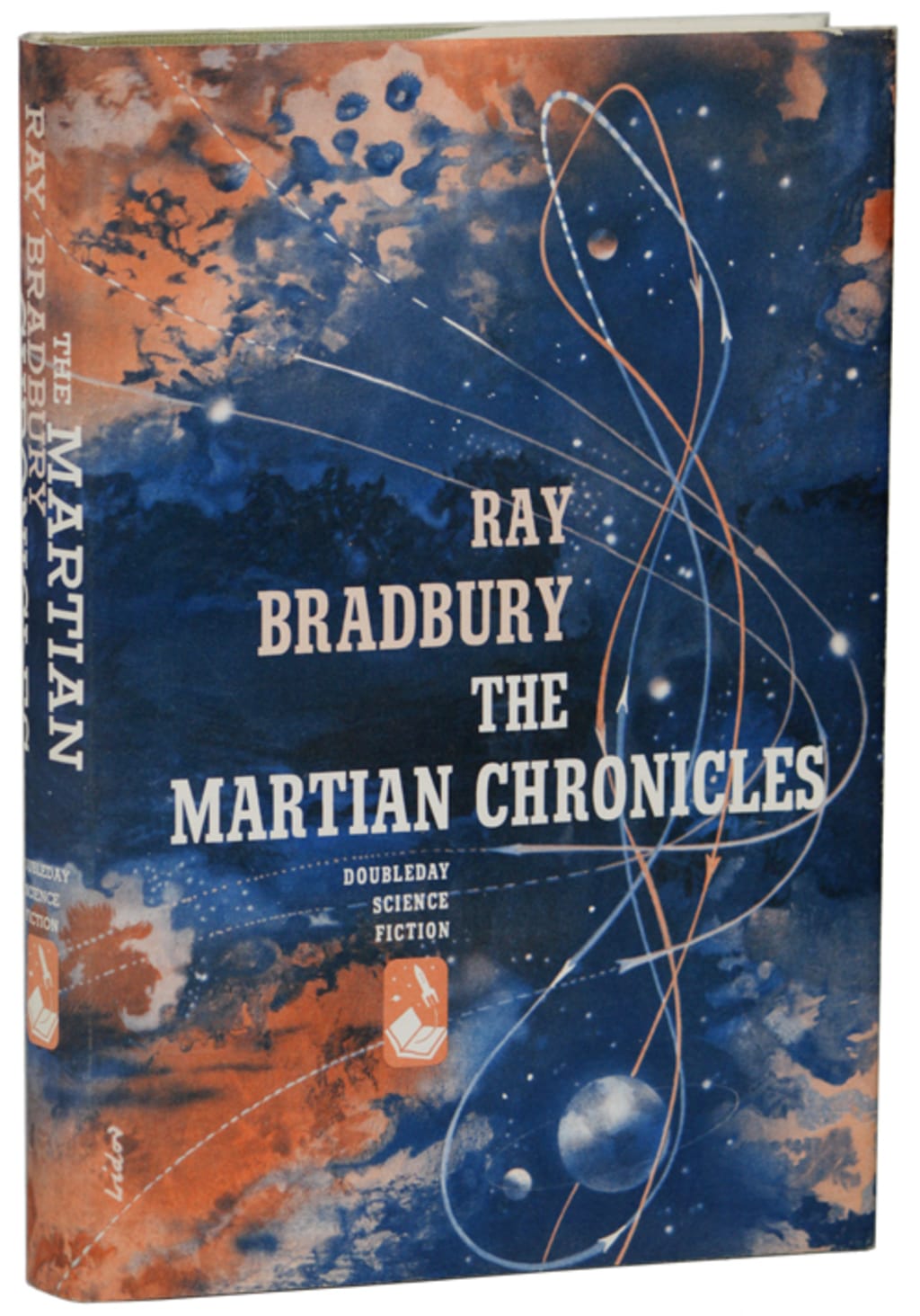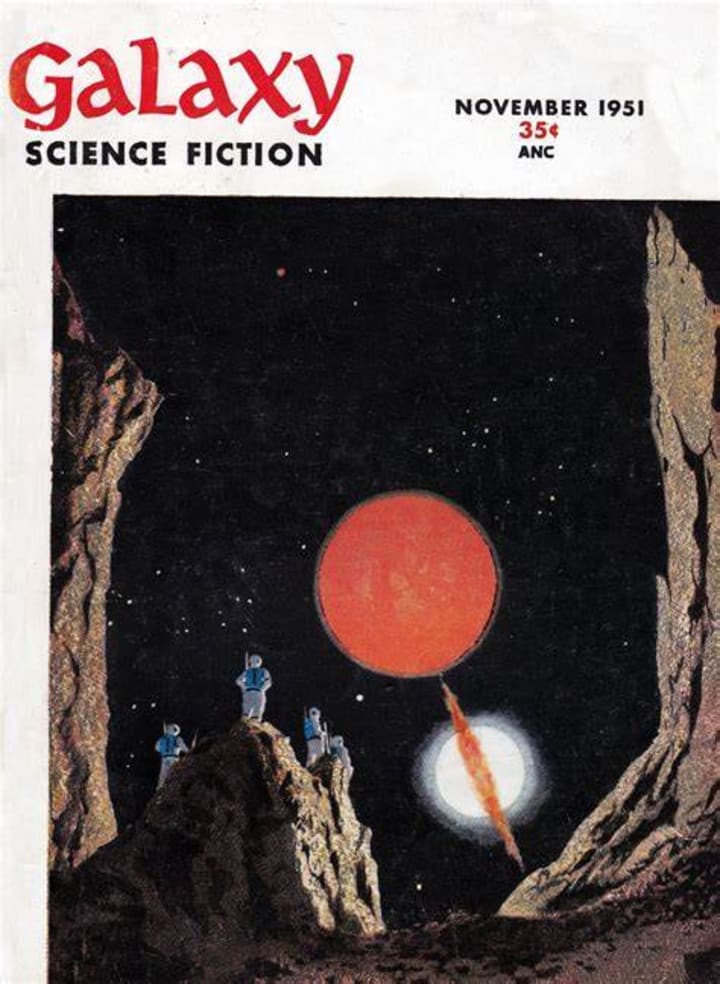The 1950s Science Fiction Podcast: S1E6
This episode is about 50s sci-fi literature.

Start of Transcript
Introduction.
Hello and once, again welcome to the 1950 Science Fiction Podcast. You are now listening to the sixth episode for season one. The show is also the first for the new year. I hope that everyone had a great holiday season and that you have stayed safe amid the pandemic. So far, my family and loved ones have not been affected as of yet. In this episode, I will discuss the pulp novels and magazines of interest from the 1950s. This is an area I have not had too much experience in, and I have wanting to explore it further. I know that I have read a few 1950s sci-fi novels over the years, but I can't remember what titles I have read.

Some of the stories I have read.
I have read many different sci-fi novels over the years, most of the material relative to the year I first read it. However, I did read a few stories from the past, including the 50s. I read both novels and short fiction by well-known writers like Ray Bradbury and Isaac Asimov. From Asimov, I enjoyed reading his Robot detective series The Caves of Steel and The Naked Sun, both published in the 50s. The series continued in the 80s with two more novels written by Asimov with the same protagonists. In the 90s and early 2000s, a series of robot detective novels set in the same universe with different characters introduced. The series had various writers creating stories and situations that involved Asimov's Three Laws of Robotics.

Perhaps one of the most well-known 50s sci-fi series is Ray Bradbury's The Martian Chronicles. First published in 1950, it was a collection of short stories that takes place on the planet Mars during the 21 century. Each was a self-contained plot with different characters and plots. However, all narratives had underlying themes that dealt with racism, nuclear war, and social justice. They were printed in the late forties to the early fifties in various magazines. The Martian Chronicles stories turned into radio drams, and some were in comic book form as well. I have only read one of the stories of the Martin Chronicles. I read The Million Year Picnic during my high school years back in the 80s. More recently, I have listened to the audio podcast from classic 50s sci-fi radio dramas, X-Munis-One, which aired a few of the Martian Chronicles stories. In the 80s, the Martian Chronicles aired as a mini-series on NBC television in the US. I watched that presentation as well.
Another short story I read while in high school was A Logic Named Joe by Murray Leinster. The sci-fi short story written in the 40s, produced as a radio drama in the 50s, predicted the internet and personal computing. Like with the Martian Chronicles, I listened to the radio drama via podcast. It is a good story and worth checking out. When I first read the story, the web was not a part of our daily lives as of yet. However, personal computing was starting to become commonplace, and I thought that was what "Logic" was in the context of the story.

Short story Magazines.
The 50s had a great variety of short fiction magazines, and there was plenty of science fiction and fantasy titles. Some titles started publishing in the 30s and 40s and continued into the 50s. However, some were started in the 50s. Two such magazines were Galaxy Science Fiction and If. I have become familiar with both magazines via the internet archive. There a user can find many downloaded issues for free. I have downloaded issues of IF and some pulp novels as well. Galaxy was started in 1950 by a French-Italian company called World Editions were trying to succeed in the US market. The digest-sized perioral stopped publication in 1980. Its editor, H.L. Gold made the magazine into a best seller and sought stories that emphasized social interactions rather than technology. Gold had some of SF's best writers presented in his magazine. The story The Fireman, retitled Fahrenheit 451, by Ray Bradbury was first published in one of the issues. Also, Robert Heinlein's The Puppet Masters was published in the magazine: along with other soon-to-be well-known authors.

IF science fiction magazine, published in 1952, was printed by Quinn Publications. Its owner was James L. Quinn, had got the idea of creating if from the success he saw from two other magazines. The two were Fate and Other Worlds, while the latter dealt with science fiction while the former discussed the paranormal. During its publication, the magazine had medium sales and was considered of lower quality. The magazine's quality improved over time; during the 60s, Robert Heilines's story The Moon is a Harsh Mistress was published in IF. While Larry Niven saw his story The Coldest Place in the pages of IF. Once sci-fi author Fredrick Pohl took over as editor during the 60s, IF magazine would see better success. During the 70s, the magazine merged with Galaxy Science Fiction. The merger was due to declining interest and sales in the periodical, and Pohl had left as editor.

Pulp novels.
Some pulp novels first appeared as short stories in some short fiction magazines. I have not read any of these stories as of yet but plan to do so shortly. I have found a small selection in archive.org and one other website. I do plan to discuss some titles in a future podcast, either complete novels; or some of the short stories. I will talk about other magazine titles I haven't mention here as well.

Final Thoughts.
At this point, I am going to stop the podcast here. I don't have any in-depth reviews yet. That will come in a future podcast. I just wanted to talk about a few experiences I have had in reading sci-fi literature from the 50s. Ever since I found book titles from the internet archive, I have been eager to read them but, I have not had the time.
I do want to thank everyone who has taken the time to listen to the show. I now have over 400 plays, and the podcast is continuing to grow. I would like to remind my listeners that my podcast notes page is at my vocal.media profile page. There you will find a written transcript of the podcast along with photos, links, and the podcast itself. Also, you can read any of the three years of articles I have written for vocal.media. The subjects included are podcast, sci-fi, paranormal, and true crime. So feel free to take a look at it. Well, that is all for now, I hope to be back soon with another show. I am only able to create my podcast intermittently so I do ask for everyone's patience. Thanks for listening.
End of Transcript
About the Creator
Edward German
A long-time sci-fi fan who loves the internet. I am also writing on subjects other than sci-fi.
you can follow me on "X" @EdwardGerman3 Listen to my podcast The 1950s Science Fiction Podcast on Spotify for Podcasters.






Comments
There are no comments for this story
Be the first to respond and start the conversation.